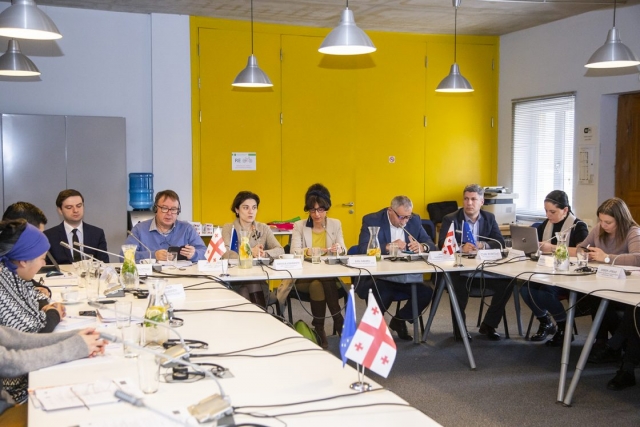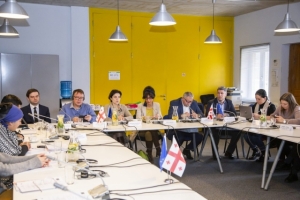CENN Hosts Steering Committee Meeting
On February 25, CENN hosted a steering committee meeting to discuss the development of Keda LEADER and EMBRACE Tsalka projects. To share the work progress and their ideas on developing future cooperation representatives of the European Union supported the ENPARD program in Georgia, the Ministry of Environment Protection and Agriculture of Georgia, Ministry of Agriculture of Adjara AR and ENPARD implementing partners gathered in CENN’s Green Center in Bulachauri.
As Nana Janashia, CENN’s Executive Director delivered opening remarks, wishing the gathered an efficient meeting, and noting that the “steps forward taken in agriculture development is the starting point of democratic processes.” After everyone finished introducing themselves, Nino Gaprindashvili, the Project Manager of Keda LEADER and Melano Tkabladze, the Project Manager of EMBRACE Tsalka delivered presentations about the ENPARD project and LAG activities in these municipalities, catching the meeting participants up with the work progress. While the presenters also spoke of the joint initiatives that can be taken up to strengthen the partnerships between the LAGs (Local Action Group) and their municipalities, the other committee members asked questions and made suggestions, having in mind the future development of the projects.
Amongst respective guests of the steering committee meeting were Mr. Georges Dehoux, Programme Manager and Agricultural Attaché of the EU Delegation to Georgia, and Mrs. Ketevan Khutsishvili, Programme Manager at the Delegation of the European Union to Georgia. While Mr. Dehoux positively assessed the country’s progress in rural development, Mrs. Khutsishvili outlined agriculture’s importance in Georgia’s overall development, saying that: “if we want Georgia to develop, developing agriculture is where we should start. The country won’t develop itself.”
Both EU representatives talked to Georgia Today about CENN’s work in Georgia. Mr. Dehoux noted that: “I haven’t been in the country for very long but I know CENN more for their environmental actions, like the waste separation project and so forth. They are very important actors in the local scene, it seems. I can’t really judge in terms of the implementation of the projects, but so far, it seems to be good.”
Mrs. Khutsishvili told us that “in both Tsalka and Keda, CENN is closely working with the population, so that the needs of the local government and people are appropriately met, and the finance provided by the EU is efficiently used for the improvement of the community.”
The other respective guests were from the UNDP and FAO. Nodar Kereselidze, National Project Manager at UNDP Georgia gave an overview of the planned actions within ENPARD III; and Juba Maruashvili, Senior National Grant Management Expert for FAO-ENPARD projects in Georgia, who presented the points on FAO support to the agriculture sector in Georgia under ENPARD III.
The meeting wrapped up, as the participants agreed to carry out activities in co-ordination with the ongoing projects, and through their actions, unite over CENN’s slogan: shape the future by changing today.
The EU-supported ENPARD projects “Embrace Tsalka” and “Keda Leader is implemented by CENN in partnership with the Center for Strategic Research and Development of Georgia (CSRDG), Institute of Democracy (IoD), Austrian Institute for Regional Studies and Spatial Planning (ÖIR), the Georgian Farmers’ Association (GFA) and Institute for Rural Development Research (IFLS). The projects aim at diversifying the local economic activities, improving the investment climate, and empowering competitive agricultural and environmental practices in Tsalka and Keda Municipalities via bottom-up strategic planning of rural development.
The EU is supporting agriculture and rural development in Georgia through its ENPARD Programme. Implemented since 2013 with a total budget of EUR 179.5 million, the main goal of ENPARD is to reduce rural poverty in Georgia. The first phase of ENPARD in Georgia focused on developing the potential of agriculture. The second and third phases of ENPARD focus on creating economic opportunities for the rural population that go beyond agricultural activities.
By Nini Dakhundaridze











